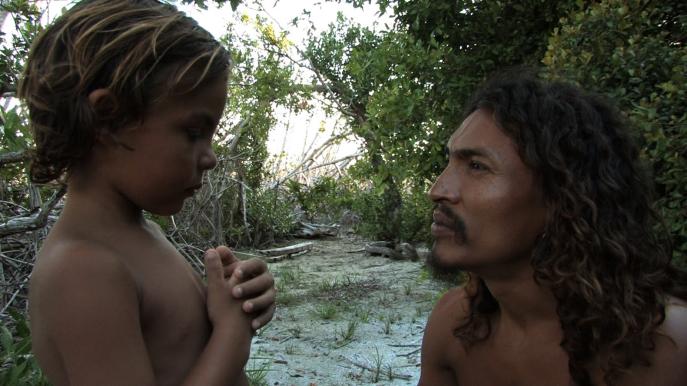Director: Pedro González-Rubio
Starring: Jorge Machado, Natan Machado Palombini, Roberta Palombini, Nestór Marín
UK Release date: 14 September 2010
Certificate: U (73 mins)
This is the refrain of the song that floats to the top of Alamar, a slow beautiful documentary of two fishermen and the youngest member of their family. Natan’s eyes are how we are introduced to the world of the sea next to the Banca Chinchorro, a reef lying off the shore of Mexico. He’s a young boy whose mother and father are separated: mum Roberta is an Italian in Rome, his dad Jorge is a fisherman with his father. Through Natan we have explained to us the names of flowers, birds, fish.
It’s very easy for an audience based on the edge of a British autumn to project onto the lives of Natan’s father and grandfather all our hopes for sun, ease and peace. The underwater shots of the two men diving for lobster don’t need any stardust to make them seem like another world – this is clearwater territory, so that all the inhabitants with their technicolour skins and antennae, claws and carapaces, cut through all the gloom of early September with their cry of exoticism. Of course a fish would never think of itself as exotic, nor would, generally, a fisherman; exotic is merely the word we give to the experience of seeing our boredom’s dreams matched by something unusual. In fact Alamar is almost the opposite of exotic. The camera lingers over details, and not just the tourist-board sunsets but bugs, fish scales, the circular conversations about coffee. Life for the fishermen is just as repetitive as life in an office can feel. The film doesn’t encourage us to see their lifestyle as some kind of back-to-nature idyll and the sea feels a non-revelatory place: simply a place of work and of food.
Odd then that a film all about water should be so dry. There’s no line of story running through Alamar that might have acted as a leavening agent. Natan’s trip stops and starts with shots of his life in Italy, but there is no sense of his being a life-changing journey, or of the dislocation other than his tears at leaving both mum and then dad. Interesting comparisons are with Encounters at the End of the World and The Story of the Weeping Camel. Herzog’s documentary of life in the Antarctic is fascinating because it’s a place where the only humans there are those who have made the choice to live in such extremity. Their lives are stories enough to fill out the film with interest; and the lives of the penguins offer a counterpoint to their human observers. The Story of the Weeping Camel began as a documentary on the lives of the inhabitants of the Mongolian Gobi desert, until reality blessed the filmmakers with a ready-made story about a camel abandoned by its mother, and the herders’ attempts to reconcile them. Alamar doesn’t have the same human fascination nor does it have any narrative drive. An egret (heron) that Natan names Blancoquito becomes a character for a few shots, as it is tempted to feed from their hands, but the bird soon disappears and they go fishing again.
Ultimately then it’s a slow film that for all the sea’s cornucopia feels quite barren. But the loveliness of its scenery and what will be, for most of its audiences, the unusual lifestyles, can’t help but lay the specks of curiosity that the imagination may turn into pearls. Who are these people? What did the grandad mean in his throwaway line about wanting to sometimes see a different place to his usual cabin? Why did they paint the cabin yellow and put up a cloth poster outside? How did Roberta and Jorge meet, fall in love, and separate? What does Natan tell his school friends? The canvas that is blank apart from the few facts the film records requests a response. If you’re ready for active film-watching then Alamar will reward you.
Nathan Koblintz
![]() Visit this film's official web site
Visit this film's official web site






